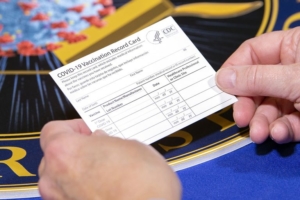January 18, 2022
Media contact: National Consumers League – Carol McKay, carolm@nclnet.org, (412) 945-3242
Washington, DC—Today marks the launch of the eleventh annual Script Your Future Medication Adherence Team Challenge, a two-month-long intercollegiate competition among pharmacy student teams and faculty for creating solutions to raise awareness about medication adherence as a critical public health issue. The Challenge, hosted by the National Consumers League (NCL), is returning to university campuses across the country building on a decade of successful student competition and innovation.
The Challenge is an integral part of Script Your Future, a campaign launched by NCL and its partners in 2011 to combat the problem of poor medication adherence in the United States, where nearly three out of four patients do not take their medication as directed. In addition to medication adherence, in 2022 teams will counsel patients on vaccine confidence and safe drug disposal.
Both faculty and student participants from last year’s awarded teams have reflected on their experiences in the Script Your Future program:
“The Script Your Future Team Challenge was a great way for our pharmacy students to collaborate with other health professional students and positively impact our community by being a part of the COVID-19 response efforts, vaccinating thousands of individuals against COVID-19, addressing vaccine hesitancy, as well as providing patient education regarding medication adherence. We appreciate the opportunity the Challenge offered our students, and we are looking forward to participating again this year!”
—Lisa Hong, PharmD, Associate Professor, Loma Linda University School of Pharmacy
“Participating in Script Your Future was a refreshing experience and helped me and my students step outside of our frustration with the COVID-19 pandemic and do something about it. It was wonderful to have the opportunity to work with colleagues and students from other programs toward a single goal. Everyone, especially the students, really stepped up and thought outside the box to achieve the goals of Script Your Future.”
—Erin Gysbers, PA-C, Didactic Director, Assistant Professor, Loma Linda University
“I am extremely proud of the efforts of our team to achieve vaccination rates as high as 96 percent in our community. This is just a small testament to what we are all capable of in contributing to keep our communities safe and I am excited for future efforts.”
—Joseph Velasco, PharmD Class of 2022, Loma Linda University School of Pharmacy
“The Script Your Future Team Challenge has given me the opportunity to create numerous online resources to help patients with their medication adherence and to increase their COVID-19 vaccine confidence. This experience challenged me to work creatively with our WesternU’s AMCP Research and Education committee to not only create helpful infographics, but to widen the accessibility of these resources through QR codes and a texting service. These electronic tools gave patients improved access to our helpful resources on our very own WesternU AMCP Health Helper website. We also expanded onto social media and physically delivered our resources to pharmacies, local communities, and schools in Pomona, California. Participating in this program has been an experience that will resonate through my future career.”
—Andrew Pham, PharmD Class of 2024, Western University of Health Sciences College of Pharmacy
As the nation continues to navigate the COVID-19 pandemic, Script Your Future teams are encouraged to build their campaigns centering around vaccine confidence to help address hesitancy and mitigate further spread of the coronavirus. Teams are encouraged to tailor their outreach towards chronic health issues including cardiovascular disease, hypertension, diabetes, and respiratory illnesses. Challenge administrators also welcome the inclusion of other disease groups that would benefit from medication adherence-related interventions. Teams are also encouraged to integrate messaging on the importance of safe drug disposal. Patient counseling on this topic will help patients to know how to properly and safely dispose of their medications after they are no longer needed.
Through March 28, inter-professional teams—including student pharmacists, nurses, doctors, and others—will implement creative approaches to outreach in their communities to raise awareness and improve understanding about medication adherence. At the end of the Challenge, teams submit entries for review by national partner organizations, and winners are recognized for their efforts to improve medication adherence.
Last year, Team Challenge student health professionals were met with unique circumstances, hurdles, and obstacles as they navigated the historic COVID-19 pandemic, which resulted in school closures, event cancelations, and a host of other challenges. In spite of this, more than 5,000 future healthcare professionals and volunteers from 78 participating health professions schools participated. Collectively, the teams directly counseled close to 150,000 patients and vaccinated over 134,000 consumers, nationwide. Since the Team Challenge began in 2011, more than 18,800 future healthcare professionals have participated, reaching nearly 26 million consumers.
Last year’s national award winner was University of Charleston School of Pharmacy. Other schools winning category-specific honors included: University of the Sciences School of Pharmacy; Loma Linda School of Pharmacy; Howard University College of Pharmacy; Wilkes University Nesbitt School of Pharmacy; University of Pittsburgh School of Pharmacy; and Western University College of Pharmacy. Additional participating schools received finalist and runner-up status across a variety of award categories.
The Team Challenge is sponsored by the American Pharmacists Association (APhA), the National Association of Chain Drug Stores (NACDS) Foundation, and the National Community Pharmacists Association (NCPA).
To learn about previous winners, visit Script Your Future’s online home.
For more information on the Challenge, visit the Team Challenge community website.
Tweet along with us during the Team Challenge using #SYFchallenge, and follow the campaign @IWillTakeMyMeds.
###
About National Consumers League
The National Consumers League, founded in 1899, is America’s pioneer consumer organization. Our mission is to protect and promote social and economic justice for consumers and workers in the United States and abroad. For more information, visit www.nclnet.org.
About Script Your Future
Script Your Future is a campaign of the National Consumers League (NCL), a private, non-profit membership organization founded in 1899. NCL’s mission is to protect and promote social and economic justice for consumers and workers in the United States and abroad. For more information about the Script Your Future campaign, visit ScriptYourFuture.org. For more information on NCL, please visit nclnet.org.



 By NCL Director of Health Policy Jeanette Contreras
By NCL Director of Health Policy Jeanette Contreras















